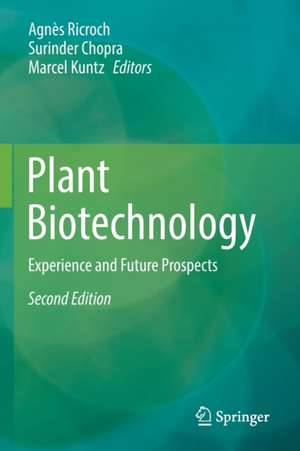Plant Biotechnology: Experience and Future Prospects
Editat de Agnès Ricroch, Surinder Chopra, Marcel Kuntzen Limba Engleză Paperback – sep 2022
| Toate formatele și edițiile | Preț | Express |
|---|---|---|
| Paperback (1) | 1217.58 lei 43-57 zile | |
| Springer International Publishing – sep 2022 | 1217.58 lei 43-57 zile | |
| Hardback (1) | 1223.74 lei 43-57 zile | |
| Springer International Publishing – 31 aug 2021 | 1223.74 lei 43-57 zile |
Preț: 1217.58 lei
Preț vechi: 1484.86 lei
-18% Nou
Puncte Express: 1826
Preț estimativ în valută:
233.06€ • 253.24$ • 195.89£
233.06€ • 253.24$ • 195.89£
Carte tipărită la comandă
Livrare economică 21 aprilie-05 mai
Preluare comenzi: 021 569.72.76
Specificații
ISBN-13: 9783030683474
ISBN-10: 3030683478
Pagini: 304
Ilustrații: VIII, 304 p. 28 illus., 27 illus. in color.
Dimensiuni: 155 x 235 mm
Greutate: 0.44 kg
Ediția:2nd ed. 2021
Editura: Springer International Publishing
Colecția Springer
Locul publicării:Cham, Switzerland
ISBN-10: 3030683478
Pagini: 304
Ilustrații: VIII, 304 p. 28 illus., 27 illus. in color.
Dimensiuni: 155 x 235 mm
Greutate: 0.44 kg
Ediția:2nd ed. 2021
Editura: Springer International Publishing
Colecția Springer
Locul publicării:Cham, Switzerland
Cuprins
Part I: The Tools for Engineering Plants.- 1. The Evolution of Agriculture and Tools for Plant Innovations. Genome editing methods and applications.- 2. Techniques and Tools of Modern Plant Breeding.- 3. Genomic Methods for Improving Abiotic Stress Tolerance in Crops.- 4. New technologies for precision plant breeding.- 5. CRISPR Technologies for Plant Biotechnology Innovation.- Part II: Contributions to the Society.- 6. Intellectual Property Protection of Plant Innovation.- 7. Environmental Impacts of Genetically Modified (GM) Crop Use: Impacts on Pesticide Use and Carbon Emissions.- 8. Is It Possible to Overcome the GMO Controversy? Some Elements for a Philosophical Perspective.- Part III: Sustainable Management.- 9. Sustainable Management of Insect-Resistant Crops.- 10. Effects of GM Crops on Non-Target Organisms.- 11. Virus-Resistant Crops and Trees.- Part IV. Sustainable Environment.- 12. Root Traits for Improving Nitrogen Acquisition Efficiency.- 13. Sustainable Soil Health.- 14. Environmental Phytoremediation and Analytical Technologies for Heavy Metal Removal and Assessment.- Part V: Contributions to Food, Feed, and Health.- 15. Production of Medicines from Engineered Proteins in Plants.- 16. Low gluten and coeliac-safe wheat through gene editing.- 17. Near-isogenic lines as powerful tools to evaluate the effect of individual phytochemicals on health and chronic diseases.- Part VI: Contributions of Genome editing to Agriculture.- 18. Policies and Governance for plant genome editing.- 19. Exploring the roots of the old GMO narrative and why young people have started to ask critical questions.
Notă biografică
Dr Agnès RICROCH PhD, HDR is a senior lecturer at AgroParisTech and Paris-Saclay University (France) and Adjunct Professor at Pennsylvania State University (USA) in agricultural biotechnology. Member of Academy of Agriculture
Marcel Kuntz is a plant physiologist. He is also publishing articles on the political controversy over GMOs and on aspects relevant to the philosophy of science
Dr. Surinder Chopra is a Professor, Department of Plant Science, Pennsylvania State University, USA. His research focus is understanding genetic and epigenetic mechanisms of stress tolerance in maize and sorghum.
Marcel Kuntz is a plant physiologist. He is also publishing articles on the political controversy over GMOs and on aspects relevant to the philosophy of science
Dr. Surinder Chopra is a Professor, Department of Plant Science, Pennsylvania State University, USA. His research focus is understanding genetic and epigenetic mechanisms of stress tolerance in maize and sorghum.
Textul de pe ultima copertă
Written in easy to follow language, the book presents cutting-edge agriculturally relevant plant biotechnologies and applications in a manner that is accessible to all. This book updates and introduces the scope and method of plant biotechnologies and molecular breeding within the context of environmental analysis and assessment, a diminishing supply of productive arable land, scarce water resources and climate change. New plant breeding techniques including CRISPR-cas system are now tools to meet these challenges both in developed countries and in developing countries. Ethical issues, intellectual property rights, regulation policies in various countries related to agricultural biotechnology are examined. The rapid developments in plant biotechnology are explained to a large audience with relevant examples. New varieties of crops can be adapted to new climatic conditions in order to reduce pest-associated losses and the adverse abiotic effects
Caracteristici
Foreword written by Claude Debru, Dr. phil., Ph.D. Written by international scientists who conduct research to advance knowledge in various fields (molecular biology or regulation policies) NBTs including CRISPR-cas system as new tools to meet agricultural challenges are explained Written by international scientists who conduct research to advance knowledge in various fields (molecular biology or regulation policies)
